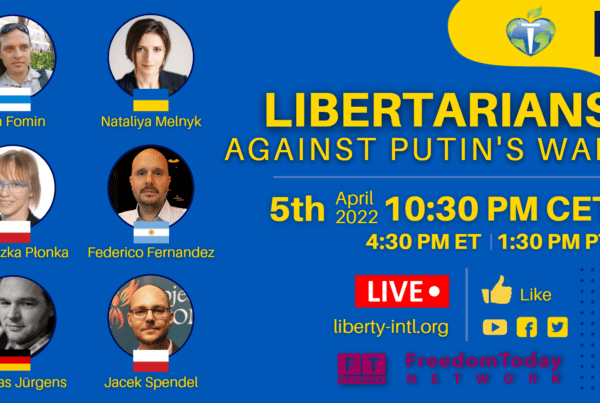As a young soldier in Afghanistan, I remember asking a superior why we didn’t venture into certain areas. Surprisingly, he said that those areas were controlled by the Taliban.
But wasn’t that the reason we were there, to get rid of them?
“No. Our job is to clear the roads of IED’s.”
But won’t they just make more?
“Yep,” he replied.
His response reflected the thinking that goes behind many US foreign policy decisions. Even though there is no point to any of this, we can’t stop now because this is what we were tasked with. The decision has already been made and it isn’t our place to question orders. A few weeks later we lost two soldiers clearing a route that is no longer in use. In other words, they died for nothing.
That’s a very hard thing for many people to accept, particularly soldiers and those who have lost loved ones. Nobody wants to believe that their husbands, fathers, brothers, and sisters died in vain. We have to believe that there is some greater purpose which justifies this tragedy.
Sadly, there isn’t one. It’s a hard pill to swallow, but it is the cold, hard truth.
We rationalize our losses by telling ourselves that they died “protecting America.” My friend was a “hero” who died “fighting for freedom.” On top of that, we’re all heroes, apparently, just for being in the military. It’s a comforting lie that we tell ourselves to avoid a very inconvenient truth, which is that I’m not a hero, and your freedom isn’t in Afghanistan.
To admit the truth is to admit that there is no point and that people are dying for no reason (much like in Vietnam, which some people still can’t accept). Who wants to tell the family of a soldier killed in Afghanistan that their father died because the government made a mistake? “Spreading democracy” in the Muslim world through force has been a spectacular failure of epic proportions, and most experts have resigned to the fact that Afghanistan is simply another failed state. “Defeating the Taliban” is no longer seen as a realistic scenario by anyone on the ground. Unfortunately, this reality has not trickled down into the minds of Americans yet, who actually believe that we can somehow “win” our “freedom” in Afghanistan and “defeat the terrorists.”
US Presidents have very little incentive to admit failure. From the president’s point of view, there is nothing to be gained politically and much to be lost. Voters, being utterly ignorant when it comes to foreign policy, will tend to blame the sitting president for “losing” a war even though it was largely the product of previous administrations. This is particularly true with America’s highly partisan political climate. Thus, the President must continue the facade of the noble fight against terrorism despite knowing that victory is impossible. To be honest with the American people is to take them out of their comfort zones, and when you’re a politician in the business of selling a dream, the last thing you want to do is make people face reality. Losing faith in the President’s ability to solve a problem might force people to question other dubious government policies with questionable benefits (like building a wall).
No politician will want to go on television and admit to the American public that the Afghanistan War is unwinnable. Due to the gamblers fallacy, most political calculations determine that because so much time, resources, and lives have been spent on this effort, it would be a total waste to quit now. This is actually true — it is a complete waste. Whatever temporary gains that were made will be undone the moment we leave (it’s already unraveling as we speak). There is no real possibility of “victory” in that country, and thus, any more time and money spent there will be wasted as well. This particular slot machine is designed in such a way that you will always lose money no matter what. There is no jackpot because it’s not even plugged in.
There is pretty much no scenario where the Taliban leaves Afghanistan or is “defeated.” They are here to stay. In a bizarre twist, our own government wants to broker a deal between the Afghan national government and the Taliban, who have their own areas of influence and zones of control. We openly acknowledge the Taliban as a political force in Afghanistan. They collect taxes, conscript soldiers, administer their own form of “justice,” and for all intents and purposes actually govern certain portions of the country.
The Afghanistan national government, one of the most corrupt governments in the world, has no chance of survival without continued and indefinite help from the United States. It does not enjoy the support of the people and likely never will. This failed experiment with democracy in Afghanistan will end the same way that it started — through bloodshed and political realignment.
Rethinking the “terrorist safe haven” ideology.
The rationale for staying in Afghanistan revolves around this concept of “terrorist safe havens.” The idea is that terrorists need a “safe place” to plan their attacks against the United States. There is very little evidence to suggest that this is actually the case. Indeed, none of the hijackers were from Afghanistan (they were from Saudi Arabia, our “great ally”), and it’s questionable what kind of “training” one could receive in Afghanistan on hijacking airplanes given that they went to flight school in the United States. Learning to put a box cutter to someone’s throat doesn’t require you to travel to Afghanistan.
9/11 was not the product of “terrorist safe havens,” but rather, an exploitation of security lapses in the pre-9/11 era. As a young child, I remember sitting in the cockpit of an inter-island commercial flight wearing the captain’s hat. Things were simpler back then, and the hijackers took advantage of this. If anything, America itself was a terrorist safe haven. All of the hijackers lived and worked here with impunity. Airport security was a dismal joke prior to 9/11, as was the ability of law enforcement to track potential terrorists. What should have been a wake-up call for heightened security and better information sharing turned into a military response that has proven to be completely ineffective at dealing with the problem, and has actually made it much worse.
Invading Afghanistan was an obvious choice for President Bush at the time (though he already planned to invade prior to 9/11). Americans demanded revenge and the price had to be paid in blood. But rather than simply using special forces and CIA assets to find Bin Laden, as was done in Pakistan, the policy of occupying Afghanistan with permanent bases was implemented based upon the “terrorist safe haven” rationale. Everything that has followed is the product of this belief. That’s why President Obama did not simply declare victory in Afghanistan after killing Bin Laden — because leaving will create a “terrorist safe haven.”
Apparently, terrorists are most dangerous when they are in far away countries with little capability of carrying out attacks in the United States. Everyone knows that you can’t just buy guns in America and shoot a bunch of people in a gay night club without first traveling to Afghanistan to receive “training” in a “terrorist safe haven.” We all know that in order to plow your cargo truck through a crowd of innocent French people, you first have to fly to Afghanistan to receive drivers “training.” Such terrorist acts have to be “planned” in secret remote “safe havens” in Muslim countries. According to the logic of our foreign policy apparatchik, terrorism is something that people have to go somewhere to learn and then bring to America, and if we just destroy these “safe havens” then we’ll all be safe. It goes without saying that this theory is completely unsupported by any kind of evidence, and exists more as a dogmatic belief than a serious consideration of the facts. To make matters worse, our foreign policy has created more terrorist safe havens in Iraq, Afghanistan, Libya, Somalia, Syria, and Pakistan, than ever existed before. ISIS and Al Qaeda controlled zero areas in Iraq or Syria under Saddam. Libya was not a terrorist safe haven until we killed Gaddafi.
Afghanistan is known as the “graveyard of empires” for a reason. The Soviet Union, which indiscriminately killed millions of Afghans over a period of 10 years, failed to pacify the restless tribes. The reason for this is simple: the only condition for victory for the Taliban is to keep fighting. That’s it. They don’t have to win any battles. They don’t have to win the support of the population. They don’t have to build infrastructure or agree to any deals with foreign governments. All they have to do is keep fighting until America leaves. Likewise, America’s only condition for victory is to get the Taliban to stop fighting, which most experts view as highly unlikely given that they have no incentive to stop and are motivated by a radical ideology that is opposed to our very presence in the country.
Imagine if the United States were invaded and occupied by a foreign power who then installed a friendly puppet government that did not enjoy the support of the population. At what point would the American people lay down their arms and stop fighting? When would we accept this new political reality and participate in the new puppet government? When would Americans stop laying improvised bombs to blow up Chinese tanks rolling through our neighborhoods? I imagine there are certain conservative segments of the US population that would probably never stop fighting until the last man, and then they would proceed to overthrow the puppet government that was installed. This is inevitable. In our case, nationalism would be the motivating factor. In the case of the Taliban, it is radical Islam. For them, this is a holy war against Western imperialism.
We simply cannot win in Afghanistan. There is no scenario where the Taliban just accepts US puppet rule. It will never happen. Whether we leave tomorrow or in another 10 years, the Taliban will still be there. The only question is how much lives, money, and resources we are willing to waste to continue this charade. How many people have to die in order for us to accept political reality?
The best course of action for the next president is to declare victory and leave. Yes, many will die. Yes, the government will fall. Yes, the Taliban will declare victory. Yes, the president will be blamed for “losing” Afghanistan. But there is really nothing any president can do to change that outcome. President-elect Trump can either deal with the problem or pass the buck as his predecessors have, but in any case, we will have to leave Afghanistan at some point. Afghanistan is not Germany. Afghanistan is not Japan. The Taliban does not and will not ever recognize the authority of the national government, and certainly will not obey any orders to lay down their arms and stop fighting. There will be no permanent occupation of Afghanistan because the resistance will never end until we leave.
It’s time that we swallow our pride and admit the truth to ourselves: we cannot create a liberal democracy in Afghanistan with our military. Fifteen years is enough. It is time to end America’s longest war and learn from our mistakes so that future generations do not repeat them.


